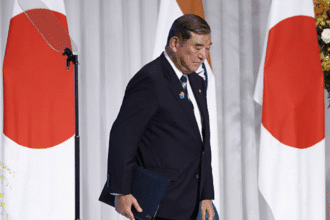Ko Wen-je, once hailed as a rising star in Taiwanese politics and a strong presidential contender, has been indicted on corruption charges, dealing a significant blow to his political career. The 65-year-old former Taipei mayor stands accused of accepting bribes totaling half a million dollars linked to a real estate deal during his tenure as mayor. He also faces accusations of misreporting campaign finances during his bid for the presidency in January. Prosecutors have announced that they are seeking a sentence of up to 28.5 years in prison.
- What Impact Will the Corruption Allegations Have on Ko’s Political Movement?
- Can Ko’s Political Career Survive This Setback?
- How Did Ko’s Political Views Evolve Over Time?
- What Role Has Ko’s Unconventional Style Played in His Political Success?
- Can Ko’s Party Overcome the Legal Challenges and Rebound?
- Are the Corruption Charges Part of a Political Suppression Campaign?
What Impact Will the Corruption Allegations Have on Ko’s Political Movement?
Ko’s indictment has raised alarms within his political movement, which had garnered significant support among voters looking for a viable alternative to Taiwan’s two dominant political parties—the ruling Democratic People’s Party (DPP) and the main opposition Kuomintang (KMT). The charges come at a time when Ko’s political presence was gaining traction, particularly following his strong showing in the presidential election earlier this year.
According to prosecutors, Ko was one of 11 individuals being prosecuted in connection with the case. Several members of his Taiwan People Party have also been charged with misappropriating political donations, deepening the controversy surrounding his party’s leadership. Ko, however, has denied all allegations of corruption. “I am innocent,” Ko stated in a press conference following the indictment.
Can Ko’s Political Career Survive This Setback?
The indictment marks a significant setback for Ko, who was a formidable contender in Taiwan’s presidential race. Despite losing the election, Ko’s performance was noteworthy—securing more than 25% of the vote, which was only 15 percentage points behind ruling party candidate Lai Ching-te’s 40%. His showing demonstrated a public appetite for a political landscape that goes beyond the traditional duopoly of the DPP and KMT.
“Even though I did not win, my message resonated with many Taiwanese who want a change,” Ko reflected after the results. His campaign for president centered on the idea of offering voters a third choice. Ko criticized the DPP for escalating tensions with Beijing, which views Taiwan as part of its territory, while also accusing the KMT of being overly accommodating to the mainland.
How Did Ko’s Political Views Evolve Over Time?
Ko’s rise to prominence began in 2014 when he supported the anti-Beijing Sunflower Movement, which advocated for Taiwan’s sovereignty. This bold stance earned him widespread support, culminating in his election as Taipei mayor as an independent candidate. He won re-election in 2018, but his politics began to evolve in ways that alarmed many of his former supporters.
“During my time as mayor, I realized that economic and diplomatic ties with mainland China were important for Taipei’s growth,” Ko explained in a 2019 interview, referring to his decision to deepen the city’s relationship with China. This shift in foreign policy was viewed by some as a betrayal of the principles that initially made him a political outsider.
What Role Has Ko’s Unconventional Style Played in His Political Success?
Known for his unpredictability and controversial rhetoric, Ko has often been called a “wildcard” in Taiwanese politics. His political career has been marked by an array of unconventional tactics, including his widely mocked appearance in a rap video during his 2018 re-election bid. “I wanted to show that I’m a mayor who connects with the younger generation,” Ko said at the time, though the video was ridiculed as an attempt to court attention.
Ko has also earned a reputation for his gaffes, often making statements that critics say undermine his political seriousness. Nonetheless, his ability to stay in the spotlight has solidified his status as a fixture in Taiwanese politics. “I am who I am, and I don’t think I need to change for anyone,” Ko once said, reflecting his defiant attitude.
Can Ko’s Party Overcome the Legal Challenges and Rebound?
Following his loss in the presidential race, Ko vowed not to abandon his political career and indicated that he would likely run for president again in 2028. However, the corruption charges and subsequent indictment have raised questions about whether his party can recover from this scandal and whether Ko himself can remain a viable candidate in the future.
“The Taiwan People Party is facing a crisis, but we must stay strong,” Ko said in a statement after his arrest. Despite the growing legal challenges, his supporters have rallied around him, with protests breaking out in response to his detention. Many of his allies have accused the DPP of orchestrating a politically motivated campaign to suppress their opponents.
Are the Corruption Charges Part of a Political Suppression Campaign?
Ko’s arrest has triggered strong reactions from his supporters, who argue that the charges are part of a broader attempt by the DPP to undermine Ko and his party. “This is political suppression, pure and simple,” said one of Ko’s close allies. “The ruling party is using the justice system to eliminate anyone who challenges their power.”
Despite these claims, the DPP maintains that the legal proceedings are unrelated to politics and that the charges are a matter of upholding the law. “We believe in the rule of law, and if someone breaks the law, they must be held accountable,” said a spokesperson for the DPP.
As Ko faces legal battles and growing pressure, it remains uncertain what the future holds for his political career and his party. Many observers will be watching closely to see whether the Taiwan People Party can recover from this scandal or if Ko will be able to rebuild his reputation in the years ahead.
In the meantime, the political landscape in Taiwan remains as divided as ever, with the DPP, KMT, and Ko’s Taiwan People Party all vying for influence in an increasingly fragmented electorate.








